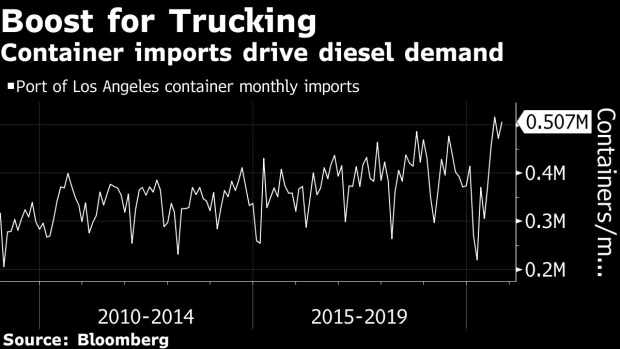Nov 20, 2020
Record Cargo Flow to West Coast Port Offers Oil Market Lifeline
, Bloomberg News

(Bloomberg) -- Containers are arriving on the West Coast at unprecedented rates, providing support to a key pocket of the oil industry.
Dockworkers at the West Coast port of Long Beach processed a record number of cargo containers last month: more than 800,000, a first in the terminal’s 109-year history, according to data from the port. Cargoes are then loaded onto diesel-powered tractor-trailers, which are barreling across the United States on the longest trips at nearly double the rate seen last year.
The pandemic has sent demand for everything from medical equipment to home-office supplies to gardening tools soaring as consumers redirect their spending on services such as trips toward goods. Retailers are also making up for products they couldn’t source earlier this year and preparing for the holiday rush.
In October, container imports at the port of Los Angeles were at a seasonal 25-year high, data compiled by Bloomberg show. The flow from container ships and associated trucking as well as train shipments has cut into supplies of diesel, also known as ULSD. West Coast diesel stockpiles have tumbled 24% from this year’s high of 15 million barrels in April, according to U.S. government data. Over the last month, miles traveled on U.S. interstates by trucks increased over 3% each week from 2019 levels, data from the Department of Transportation showed.
“The trucking industry is the one shining light for the crude oil complex since Covid hit,” said Kyle Lintner, managing director of freight consultant K-Ratio. Refining margins have “shifted dramatically in ULSD favor since trucking demand is actually up while gasoline consumption is down.”
Truck trips originating in Los Angeles and lasting more than 1,000 miles have nearly doubled from 2019 levels, according to Lintner. Most trips from southern California go to Dallas, Chicago and Atlanta, he said.
©2020 Bloomberg L.P.





